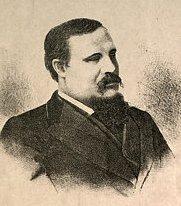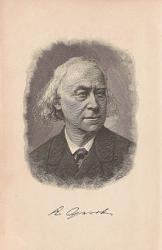Planning worship?
Check out our sister site, ZeteoSearch.org,
for 20+ additional resources related to your search.
- |
User Links
Person Results
Georg Christian Dieffenbach
1822 - 1901 Person Name: G. C. Dieffenbach Author of "Gute Nacht, gute Nacht, Sternlein kommen still und sacht" in Sonntagschulbuch
Georg Christian Dieffenbach
Jeremiah Eames Rankin

1828 - 1904 Person Name: Rev. J. E. Rankin, D.D. Author of "Come to Me" in Francis Murphy's Gospel Temperance Hymnal Pseudonym: R. E. Jeremy.
Rankin, Jeremiah Eames, D.D., was born at Thornton, New Haven, Jan. 2, 1828, and educated at Middleburg College, Vermont, and at Andover. For two years he resided at Potsdam, U.S. Subsequently he held pastoral charges as a Congregational Minister at New York, St. Albans, Charlestown, Washington ( District of Columbia), &c. In 1878 he edited the Gospel Temperance Hymnal, and later the Gospel Bells. His hymns appeared in these collections, and in D. E. Jones's Songs of the New Life, 1869. His best known hymn is "Labouring and heavy laden" (Seeking Christ). This was "written [in 1855] for a sister who was an inquirer," was first printed in the Boston Recorder, and then included in Nason's Congregational Hymn Book, 1857. Another of his hymns is "Rest, rest, rest, brother rest." He died in 1904. [Rev. F. M. Bird, M.A.]
--John Julian, Dictionary of Hymnology (1907)
========================
Rankin, J. 33., p. 951, ii. Dr. Rankin, b. in N. H. (not New Haven), and received his D.D. 1869, LL.D. 1889 from his Alma Mater. He was President for several years of Howard University, Washington, D.C. His publications included several volumes of Sermons, German-English Lyrics, Sacred and Secular, 1897; 2nd ed. 1898, &c. In addition to his hymns noted on p. 951, ii., he has written and published mainly in sheet form many others, the most important and best-known being:—
1. God be with you till we meet again. [Benediction.] Dr. Rankin's account of this hymn, supplied to us, in common with Mr. Brownlie, for his Hymns and H. Writers of The Church Hymnary, 1899, is: "It was written as a Christian good-bye, and first sung in the First Congregational Church, of which I was minister for fifteen years. We had Gospel meetings on Sunday nights, and our music was intentionally of the popular kind. I wrote the first stanza, and sent it to two gentlemen for music. The music which seemed to me to best suit the words was written by T. G. Tomer, teacher of public schools in New Jersey, at one time on the staff of General 0. 0. Howard. After receiving the music (which was revised by Dr. J. W. Bischoff, the organist of my church), I wrote the other stanzas." The hymn became at once popular, and has been translated into several languages. In America it is in numerous collections; and in Great Britain, in The Church Hymnary, 1898, Horder's Worship Song, 1905, The Methodist Hymn Book, 1904, and others. It was left undated by Dr. Rankin, but I.D. Sankey gives it as 1882.
2. Beautiful the little hands. [Little ones for Jesus.] Given without date in Gloria Deo, New York, 1900.
Dr. Rankin's translations include versions of German, French, Latin, and Welsh hymns. His contributions to the periodical press have been numerous.
--John Julian, Dictionary of Hymnology, New Supplement (1907)
Jeremiah Eames Rankin
J. W. Bischoff

1850 - 1909 Arranger of "[Come to me, come to me]" in Francis Murphy's Gospel Temperance Hymnal John W. Bischoff was born in 1849, became blind at the age of two years, came to the Congregational Church as organist and choir-director at the age of twenty-five, and remained thirty-five years up to the date of his death on Memorial Day, May 30, 1909. He was a prolific composer, most of his work being of the lyric style. In his first book, Crystal Songs, compiled in 1877 with the assistance of Otis F. Presbrey, there are thirty-two tunes of his compoistion. During many years of his service he provided music loves with a series of monthly concerts, at which a high grade of music was rendered.
American writers and compilers of sacred music by Frank J. Metcalf (New York; Cincinnati: Abingdon Press, 1925)
J. W. Bischoff
Karl Gerok

1815 - 1890 Author of "Osterheld! Osterheld!" in Liederkranz für Sonntags-Schulen und Jugend-Vereine Gerok, Karl von, D.D , was born January 30, 1815, at Stuttgart, and studied theology at the University of Tubingen. He was, from 1836 to 1840, assistant at his father's church in Stuttgart; 1840-43, lecturer (repetent) at Tübingen, and after 1844 diaconus at Böblingen, near Stuttgart. In 1849 he returned to preach at Stuttgart, where he now resides (1886), as chief court preacher and oberconsistorialrath (0. Kraus, 1879, p. 165: manuscript from Dr. von Gerok, &c).
Gerok is well known as an eloquent preacher, and has published various volumes of sermons. His fame principally rests on his sacred poetry. The best known of his poetical works is his Palmblätter, 1857, which has attained a wonderful circulation, and reached a 56th edition in 1886. A new series appeared in 1878 as Palmblätter Neue Folge (9th ed., 1885, under the title Auf einsamen Gängen). A series of poems on the Book of the Acts of the Apostles appeared as Pfingstrosen, 1864, (8th ed. 1886). His other poetical works are, Die letzte Strauss, 1885 (5th ed., 1886), Blumen und Sterne, 1867 (11th ed., 1886), and Deutsche Ostern, 1872(6th ed., 1883). The Palmblätter is in four parts: pt. 1 consisting of poems on Holy Words, i.e. mostly founded on sayings of Holy Scripture; pt. ii. on "Holy Times" (Advent, &c); pt. iii. on "Holy Mountains," and pt. iv. on "Holy Waters," i.e. on Mountains and Waters mentioned in Holy Scripture. From it a few centos have passed into some of the recent German hymn-books; and a version apparently including translations of all the poems in the ed. of the German used appeared in English as Palm leaves by Karl Gerok. Translated from the German by J. E. A. Brown. London: Strahan & Co., 1869. A large number of the individual poems have also been tr, by Miss Borthwick (who has also translated a few from the Pfingstrosen), Miss Burlingham, the Revs. Dr. R. Maguire, E, Massie, J. Kelly, and various others. But as none of these versions have passed into English common use, and as the originals are poems and not hymns, we must refer the reader to the works of these translators.
[Rev. James Mearns, M.A.]
-- John Julian, Dictionary of Hymnology
Karl Gerok


 My Starred Hymns
My Starred Hymns


